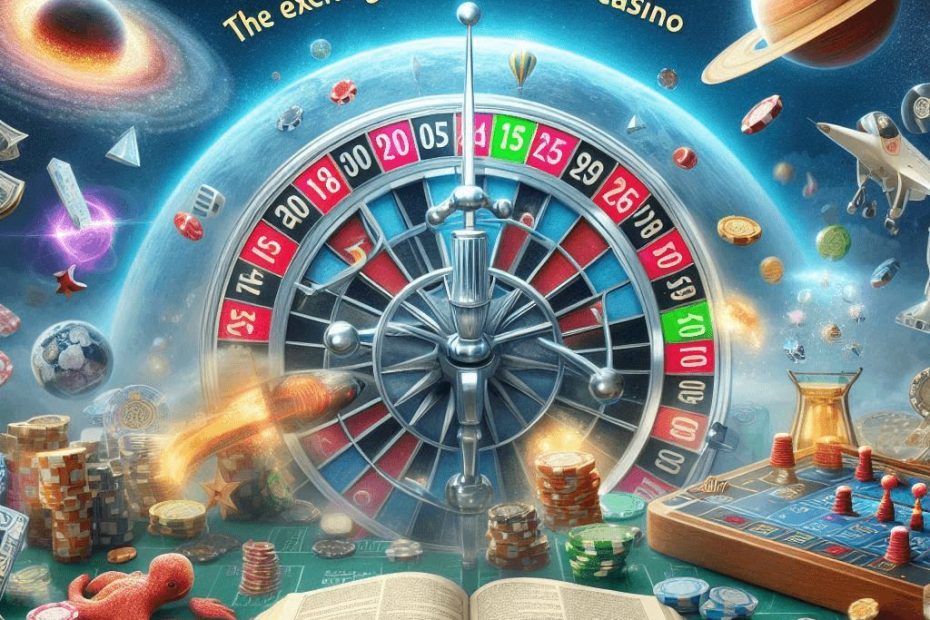Casino games have captivated players for centuries, combining elements of chance, skill, and psychology. From the spinning reels of slot machines to the strategic plays in poker and the roll of the dice in craps, the world of casinos is a fascinating blend of entertainment and science. This article delves into the underlying principles that govern various casino games, exploring the mathematics, psychology, and technology that contribute to their allure.
The Mathematics of Casino Games
Probability and Odds
At the heart of every casino game lies the concept of probability. Understanding odds is crucial for players who want to make informed decisions.
Basic Probability Concepts
- Probability is the measure of the likelihood that a particular event will occur. It is calculated as the number of favorable outcomes divided by the total number of possible outcomes.
- Odds express the ratio of favorable outcomes to unfavorable outcomes. In gambling, understanding the odds can help players assess their chances of winning.
House Edge
The house edge is the mathematical advantage that casinos have over players in any given game. This edge ensures that, over time, the casino will always come out ahead.
- House Edge Calculation: The house edge varies by game. For example, in American roulette, the house edge is about 5.26%, while in blackjack, it can be as low as 0.5% with optimal strategy.
- Impact on Players: The house edge means that players are more likely to lose money over time, but it does not dictate the outcome of individual games.
Expected Value
Expected value (EV) is a key concept in gambling that helps players understand the potential return on their bets over the long term.
- Calculating EV: To calculate the expected value, multiply the probability of winning by the payout of a win and subtract the probability of losing multiplied by the loss.
- Positive vs. Negative EV: A game with a positive EV means that, on average, players can expect to make money, while a negative EV indicates a loss over time.
The Psychology of Gambling
The Thrill of Risk
One of the most compelling aspects of casino games is the thrill that comes with taking risks. This psychological element drives many players to engage in gambling, often leading to both excitement and anxiety.
Risk vs. Reward
- High-Risk, High-Reward: Games with higher risks, such as roulette and sports betting, often offer larger payouts. This can create a sense of adrenaline that keeps players coming back.
- Low-Risk, Steady Wins: Games like blackjack and video poker may offer lower payouts but provide a more stable experience, appealing to players who prefer strategy over chance.
Cognitive Biases
Cognitive biases can significantly affect players’ decisions at the casino. Understanding these biases can help players make better choices.
Common Biases in Gambling
- Gambler’s Fallacy: This is the belief that past events can influence future outcomes in independent games. For example, a player might think a certain number is “due” to win after a long losing streak.
- Confirmation Bias: Players often focus on wins and ignore losses, reinforcing the belief that they are skilled or lucky.
The Illusion of Control
Many players feel they can influence the outcome of games, leading to a phenomenon known as the illusion of control.
- Skill-Based Games: In games like poker, players may believe their skills can significantly affect the outcome, even though luck plays a considerable role.
- Superstitions: Players often develop rituals or superstitions, such as wearing lucky clothing or following specific routines, to feel more in control of the unpredictable nature of gambling.


The Technology Behind Casino Games
Random Number Generators (RNGs)
In online casinos, fairness and randomness are ensured through the use of Random Number Generators.
- How RNGs Work: RNGs generate thousands of numbers per second, determining the outcome of each game. This ensures that results are entirely random and unpredictable.
- Fairness and Regulation: Reputable online casinos use certified RNGs to guarantee fair play, and many third-party organizations test these systems for compliance.
Game Design and Mechanics
The design of casino games incorporates psychological principles to enhance player engagement.
Engaging Game Mechanics
- Near Misses: Many slot games are designed to create the illusion of near misses, where players come close to winning. This can encourage continued play, as players feel they’re just one spin away from a big win.
- Bonus Features: Games often include bonus rounds or free spins that add excitement and increase the potential for wins, keeping players engaged.
User Interface and Experience
The user interface (UI) and overall user experience (UX) of online casino games are crucial for player retention.
- Visual and Audio Effects: High-quality graphics and immersive sound effects enhance the gaming experience, making it more enjoyable and stimulating.
- Mobile Compatibility: With the rise of mobile gaming, many online casinos have optimized their games for smartphones and tablets, ensuring that players can enjoy their favorite games anywhere.
The Different Types of Casino Games
Slot Machines
Slot machines are among the most popular casino games, known for their simplicity and potential for big payouts.
How Slot Machines Work
- Reels and Paylines: Traditional slot machines feature three or more reels with various symbols. Players win by landing matching symbols along designated paylines.
- Variance and RTP: Slot machines have different levels of variance (risk) and Return to Player (RTP) percentages, which indicate how much a player can expect to win over time.
Table Games
Table games like blackjack, roulette, and craps offer a mix of chance and strategy.
Blackjack
Blackjack is a classic card game where players aim to beat the dealer by getting a hand value closer to 21.
- Basic Strategy: Players can minimize the house edge by employing basic strategies, such as knowing when to hit or stand.
- Card Counting: Skilled players may use card counting techniques to gain an advantage, although this requires practice and concentration.
Roulette
Roulette is a game of chance where players bet on where a ball will land on a spinning wheel.
- Types of Bets: Players can place various bets, including single numbers, groups of numbers, or colors. Each bet has different odds and payouts.
- American vs. European Roulette: European roulette has a single zero, giving it a lower house edge compared to American roulette, which has both a single and double zero.
Craps
Craps is a fast-paced dice game with numerous betting options.
- Betting Strategies: Players can choose from various bets, each with different odds and house edges. Understanding these can significantly impact a player’s success.
- Shooting the Dice: The role of the shooter adds a social element to the game, making it popular among players looking for excitement.
Poker
Poker is a skill-based game that combines strategy, psychology, and luck.
Different Variants of Poker
- Texas Hold’em: The most popular variant, where players are dealt two hole cards and share five community cards.
- Omaha: Similar to Texas Hold’em, but players receive four hole cards and must use two to make their hands.
- Seven-Card Stud: Players are dealt seven cards, with some face up and some face down, and must create the best hand.
The Role of Skill
In poker, skill plays a significant role, as players must analyze their opponents, manage their bankrolls, and employ strategies to maximize their winnings.
The Future of Casino Games
Technological Advancements
The future of casino games is being shaped by rapid technological advancements.
Virtual Reality (VR) and Augmented Reality (AR)
- Immersive Experiences: VR and AR technologies are set to revolutionize the way players interact with casino games, offering immersive environments that mimic real-life casinos.
- Enhanced Social Interaction: These technologies can enhance social interactions, allowing players to engage with others in a virtual setting.
Cryptocurrency and Blockchain
The rise of cryptocurrencies is changing the landscape of online gambling.
- Secure Transactions: Blockchain technology ensures secure and transparent transactions, reducing the risk of fraud.
- Anonymous Play: Cryptocurrencies offer players a degree of anonymity, appealing to those who prefer privacy in their gambling activities.
Gamification of Casino Games
Gamification is becoming increasingly popular in online casinos, enhancing player engagement.
- Reward Systems: Many casinos implement loyalty programs, achievements, and challenges to encourage continued play.
- Interactive Features: Incorporating interactive elements, such as skill-based mini-games, can make traditional casino games more engaging.
Conclusion
The world of casino games is a captivating blend of science, psychology, and technology. Understanding the mathematical principles, psychological factors, and advancements shaping the industry can enhance your gaming experience and improve your chances of success. Whether you are playing traditional table games, spinning the reels on a slot machine, or engaging in strategic poker, the knowledge gained from this exploration can help you navigate the exciting landscape of casino gaming. As technology continues to evolve, the future of casinos promises to be even more thrilling, offering players new ways to enjoy their favorite games.
FAQs
-
What is the house edge in casino games?
The house edge is the mathematical advantage that a casino has over players, ensuring that the casino will make a profit over time. It varies by game; for example, the house edge in blackjack can be as low as 0.5%, while in American roulette, it is approximately 5.26%.
-
How can I improve my chances of winning at casino games?
To improve your chances, learn the rules and strategies of the games you play, manage your bankroll effectively, and take advantage of bonuses and promotions. Understanding the odds and house edges of different bets will also help you make informed decisions.
-
What is the difference between odds and probability?
Probability is the likelihood that a specific event will occur, while odds represent the ratio of favorable outcomes to unfavorable outcomes. Both concepts are essential for understanding gambling outcomes.
-
How do random number generators (RNGs) work in online casinos?
RNGs generate thousands of random numbers per second, determining the outcomes of games like slots and virtual tables. This ensures that the results are unpredictable and fair.
-
What role does psychology play in gambling?
Psychology plays a significant role in gambling, influencing players’ decisions through cognitive biases, the thrill of risk, and the illusion of control. Understanding these psychological factors can help players make more rational choices at the casino.
